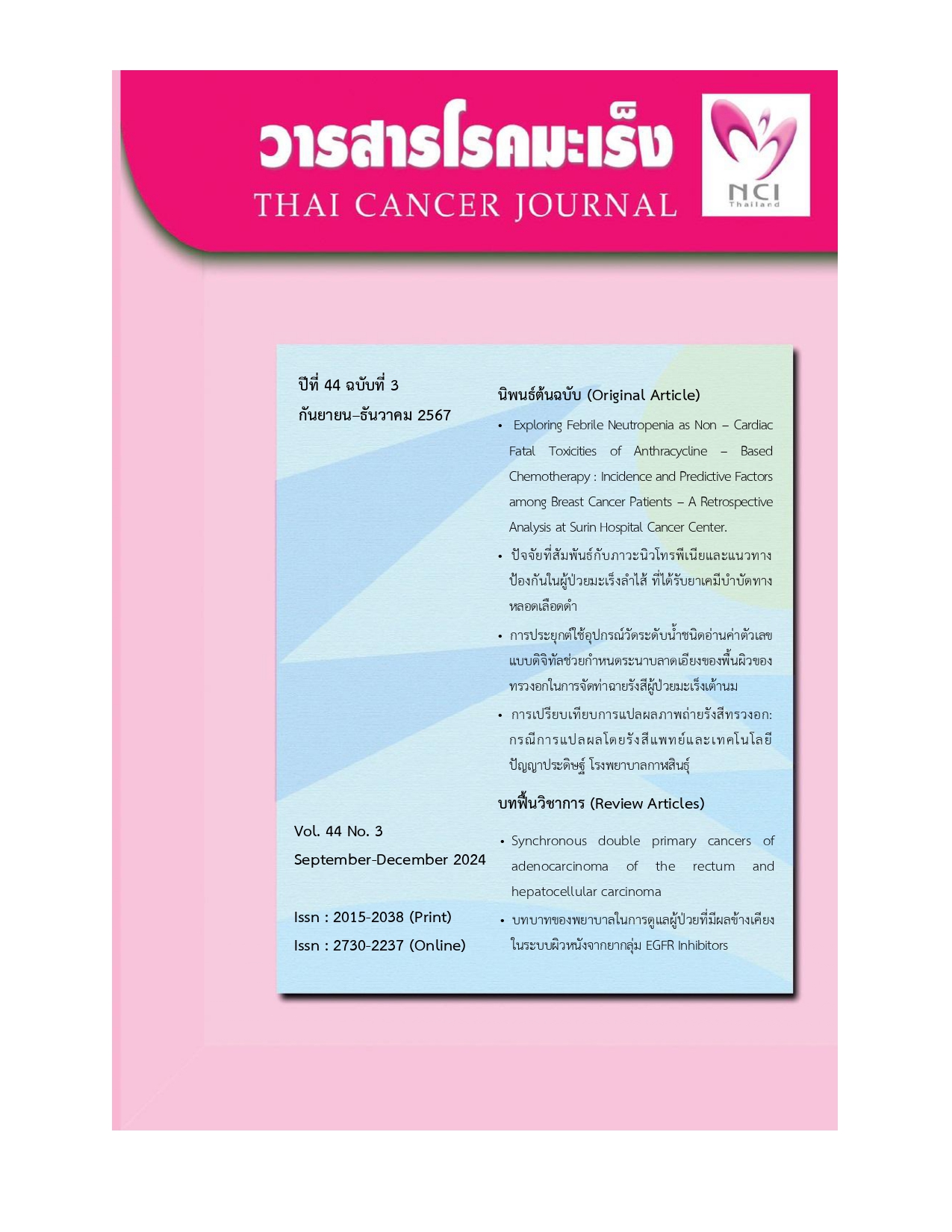Exploring Febrile Neutropenia as Non-Cardiac Fatal Toxicities of Anthracycline-Based Chemotherapy: Incidence and Predictive Factors among Breast Cancer Patients – A Retrospective Analysis at Surin Hospital Cancer Center.
Keywords:
breast cancer, anthracycline, toxicity, febrile neutropeniaAbstract
In the ongoing battle against breast cancer, chemotherapy remains a critical tool alongside immunotherapy and targeted therapy. Anthracycline-based regimens stand out as powerful chemotherapy agents in this fight. However, alongside therapeutic advancements, febrile neutropenia (FN) poses a significant challenge as a potentially fatal non-cardiac toxicity. Attention to managing FN is crucial for the safety and treatment success of breast cancer patients. We conducted a retrospective study from January 2020 to December 2022 at Surin Hospital Cancer Center, focusing on breast cancer patients treated with anthracycline-based chemotherapy. Our objective was to identify incidents and contributing factors to severe neutropenia and FN following chemotherapy. Prognostic factors were analyzed using a flexible parametric regression model in both univariate and multivariate analyses. The result showed that among the 174 eligible breast cancer patients included in the study, severe neutropenia (defined as ANC <100 cells/mm³) occurred in 2.9% of cases, while 4% developed FN, resulting in two deaths. Univariate analysis revealed associations between FN and severe neutropenia with age over 65, higher ECOG performance status scores, and comorbidities. However, in multivariate analysis, only an initial absolute neutrophil count below 3,000 cells/mm³ emerged as an independent predictor of FN (OR 8.449; 95% CI 1.165–61.290; P=0.035). Notably, the severity of neutropenia did not significantly vary based on patients’ nutritional statuses. In conclusion, the study highlights FN as a significant complication of anthracycline-based chemotherapy in breast cancer patients. The identification of baseline neutrophil count as a predictive factor emphasizes the importance of pre-chemotherapy screening and proactive management strategies to mitigate FN risk and improve patient outcomes.
References
NCCN Guidelines® Insights: Breast Cancer, Version 4.2023. Journal of the National Comprehensive Cancer Network, Volume 21, Issue 6, June 2023
Daniel F. Hayes and Marc E. Lippman. Breast cancer, Section 1 Neoplastic disorder, PART 4 oncology and hematology. Harrison’s Principles of Internal Medicine, Twentieth Edition. Page 555–65.
Edward A. Sausville and Dan L. Longo. Principles of Cancer treatment. Section 1 Neoplastic disorder, PART 4 oncology and hematology. Harrison’s Principles of Internal Medicine, Twentieth Edition. Page 480–501.
Kuderer NM, Dale DC, Crawford J, et al. Mortality, morbidity, and cost associated with febrile neutropenia in adult cancer patients. Cancer. 2006;106:2258-66.
Alexandre C, Christy C, Joen C, et al. Incidence of febrile neutropenia among early-stage breast cancer patients receiving anthracycline-based chemotherapy. 2012 Jul;20:1525-32. doi: 10.1007/s00520-011-1241-6.
Hye SK, Suk YL, Ju WK, et al. Incidence and predictors of febrile neutropenia among early-stage breast cancer patients receiving anthracycline-based chemotherapy in Korea. 2016 S. Karger AG, Basel. DOI: 10.1159/000449226
Sun YM, Sun kB, Chi HM, et al. Risk factor of febrile neutropenia in early breast cancer patients receiving anthracycline-based chemotherapy. Clin Oncol. 2020;5: 1763.
Kim CG, Sohn J, Chon H, et al. Incidence of febrile neutropenia in Korean female breast cancer patients receiving preoperative or postoperativedoxorubicin/Cyclophosphamide followed by docetaxel chemotherapy. J Breast Cancer. 2016;19:76–82.
Chan A, Chen C, Chiang J, et al. Incidence of febrile neutropenia among early-stage breast cancer patients receiving anthracycline-based chemotherapy. Supportive Care Cancer. 2012;20:1525-32.
Lyman GH, Michels SL, Reynolds MW, et al. Risk of mortality in patients with cancer who experience febrile neutropenia. Cancer. 2010;116:5555-63.
Downloads
Published
Issue
Section
License
Copyright (c) 2024 Thailand's National Cancer Institute Foundation

This work is licensed under a Creative Commons Attribution-NonCommercial-NoDerivatives 4.0 International License.
บทความทีตีพิมพ์ในวารสารโรคมะเร็งนี้ถือว่าเป็นลิขสิทธิ์ของมูลนิธิสถาบันมะเร็งแห่งชาติ และผลงานวิชาการหรือวิจัยของคณะผู้เขียน ไม่ใช่ความคิดเห็นของบรรณาธิการหรือผู้จัดทํา







